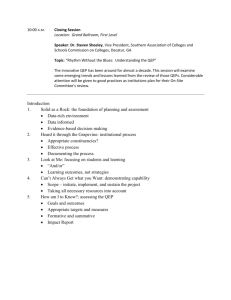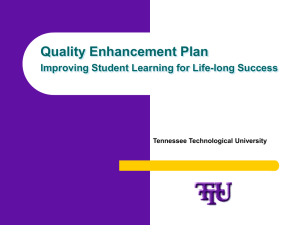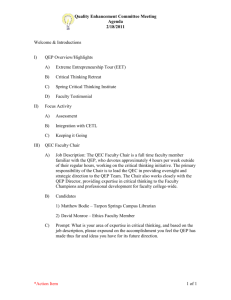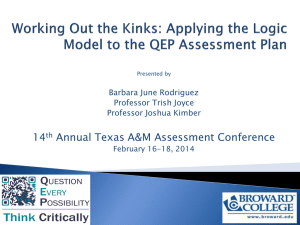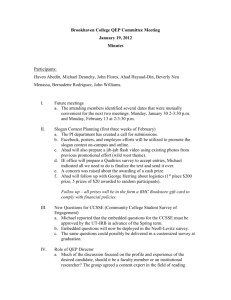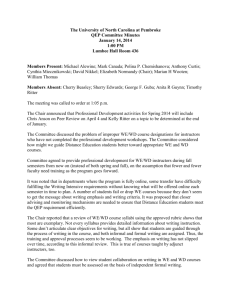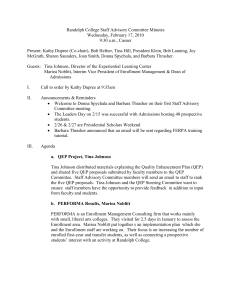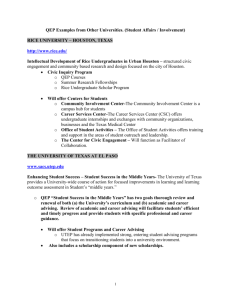First-Year Composition - University of the Incarnate Word
advertisement
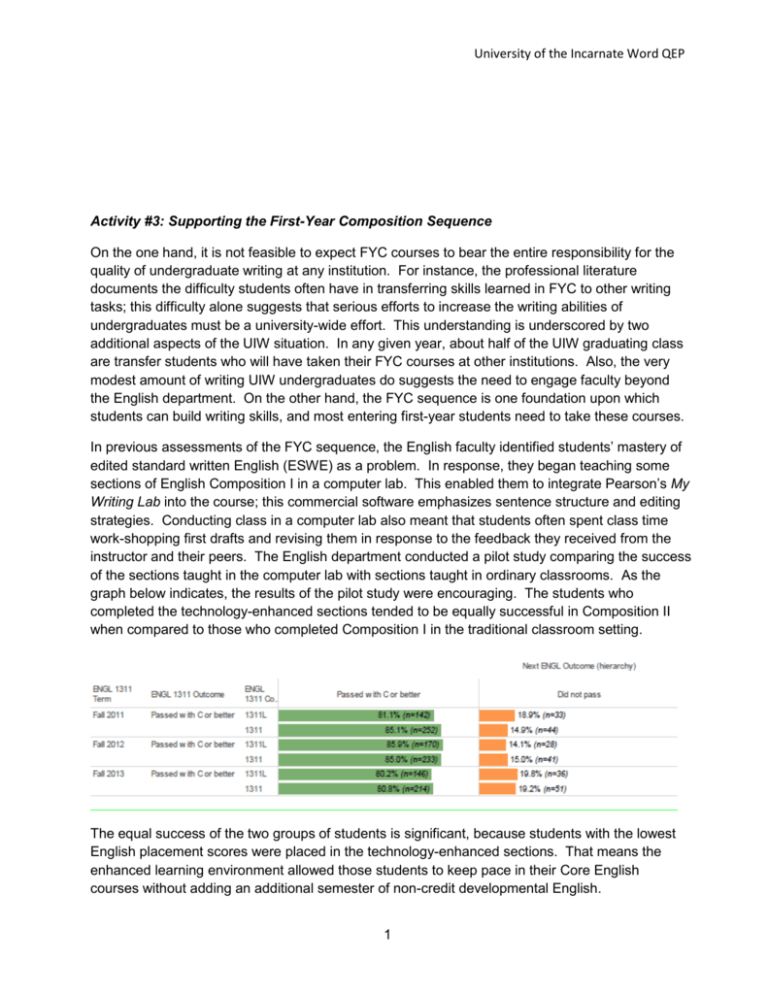
University of the Incarnate Word QEP Activity #3: Supporting the First-Year Composition Sequence On the one hand, it is not feasible to expect FYC courses to bear the entire responsibility for the quality of undergraduate writing at any institution. For instance, the professional literature documents the difficulty students often have in transferring skills learned in FYC to other writing tasks; this difficulty alone suggests that serious efforts to increase the writing abilities of undergraduates must be a university-wide effort. This understanding is underscored by two additional aspects of the UIW situation. In any given year, about half of the UIW graduating class are transfer students who will have taken their FYC courses at other institutions. Also, the very modest amount of writing UIW undergraduates do suggests the need to engage faculty beyond the English department. On the other hand, the FYC sequence is one foundation upon which students can build writing skills, and most entering first-year students need to take these courses. In previous assessments of the FYC sequence, the English faculty identified students’ mastery of edited standard written English (ESWE) as a problem. In response, they began teaching some sections of English Composition I in a computer lab. This enabled them to integrate Pearson’s My Writing Lab into the course; this commercial software emphasizes sentence structure and editing strategies. Conducting class in a computer lab also meant that students often spent class time work-shopping first drafts and revising them in response to the feedback they received from the instructor and their peers. The English department conducted a pilot study comparing the success of the sections taught in the computer lab with sections taught in ordinary classrooms. As the graph below indicates, the results of the pilot study were encouraging. The students who completed the technology-enhanced sections tended to be equally successful in Composition II when compared to those who completed Composition I in the traditional classroom setting. The equal success of the two groups of students is significant, because students with the lowest English placement scores were placed in the technology-enhanced sections. That means the enhanced learning environment allowed those students to keep pace in their Core English courses without adding an additional semester of non-credit developmental English. 1 University of the Incarnate Word QEP In this QEP activity, the university will support the English department’s revision of the FYC sequence in two ways. First, over the five-year course of the project, it will provide two additional computer labs (in-kind budget) so that ultimately all main campus sections of the FYC sequence can be taught in that setting. Sections of FYC courses will be moved to the computer lab setting as the additional facilities become available and as faculty development progresses. The second way that the QEP will support this revision of the FYC sequence is by funding monthly workshops dedicated to the needs of the English instructors who will be learning the new software and adopting teaching strategies that make the most of the available technology. These workshops, focused on the particular needs of the faculty teaching FYC, are distinct from CTL workshops offered to the general faculty. Writing and Learning Center One immediate consequence of this increased focus on writing is that more students will seek support from the existing Writing and Learning Center (WLC). The WLC director plans to increase the number of tutors and in-class support to faculty. To provide the planned support to the QEP, the staffing of WLC will be expanded. The first-year of the QEP budget includes funds to hire an evening supervisor; the addition of this part-time employee makes it feasible to offer more individual tutoring sessions on evenings and weekends and frees some of the director’s time to assist with faculty development workshops. While the current number of tutors is adequate to support some increase in usage, additional tutors will be added starting in year 3; the QEP budget for those years includes funds for hiring additional tutors for WLC. Communicating About the QEP While the ultimate aim of the QEP is to improve student writing, the planned activities all involve faculty. That means the primary audience for QEP awareness is the faculty members engaged in undergraduate teaching; this communications effort will be planned and directed by full-time convergent media faculty and students led by the QEP communication director. The faculty awareness campaign will begin with the provost’s annual New Year faculty reception, where the details of QEP activities will be presented to the assembly of all full-time faculty members. The presentation will include an interactive element – cards at each table for faculty to note specifically where they and their program fit into the QEP, and to let the implementation team know which workshop topics are most interesting. The outcomes for that all-faculty workshop will be for every faculty member to demonstrate their awareness of the key features of the QEP. First, that the three QEP activities are the WAs, CTL workshops, and support to the FYC faculty. Second, whether their program takes part in a WA during a specific year. Third, their preferences for CTL writing-related workshops. Ongoing faculty awareness will come through existing communication vehicles where faculty are accustomed to news and invitations for workshops: faculty email, posted flyers, distributed flyers, and The Word Today email newsletter. At the same time, several initiatives for student awareness will reinforce the value of the QEP. Messages and media will be developed to lead UIW students to value their writing ability. Similar themes will be integrated into family and student orientations and welcome activities to convey the importance that UIW is placing on 2 University of the Incarnate Word QEP student writing. Communications will also be developed for the external community so prospective employers will be aware of the emphasis on writing in a UIW education. A budget line has been earmarked to provide printed materials and access to software as needed for the communications campaign. Communication about the QEP will culminate in a one-day conference during Year 5, organized by the implementation team. Many faculty members will have completed scholarship related to the use of writing in their courses. The conference will have two goals: to share what faculty have learned and to reward and showcase outstanding samples of student writing. The QEP budget for year 5 has allocated funds to serve as seed money for a one-day conference for 200-300 participants. As a leading Hispanic Serving Institution, UIW has an existing network of peer institutions who would be interested in participating in the conference. A detailed year-by-year timeline for each of the activities is attached separately (Appendix 10). 3
